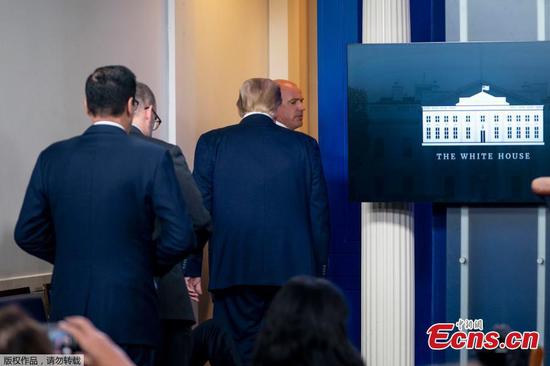Despite an unprecedented downturn in relations between the world top two economies during a pandemic, American businesses are not leaving the Chinese market, where most of them are making profits and optimistic about future growth, the U.S.-China Business Council (USCBC) said in its annual member survey on Tuesday.
The survey was conducted in late May and June among more than 100 of USCBC's member companies doing business in China; half of them are manufacturers, while 45 percent are engaged in services.
It found that projections by the companies about the five-year business outlook in China seem bullish, with nearly 70 percent expressing optimism about the market prospects, and 87 percent reporting that they have no plans to shift production out of China.
Only a small fraction — 4 percent — of those that are planning to bring operations out of the China market, are planning to return to the US, the survey found.
Besides, 83 percent of companies counted China as either the top or among the top five priorities for their companies' global strategy, according to the survey.
The findings suggest American companies remain committed to the China market over the long term, despite years of trade friction and ever-rising calls for economic decoupling by political hawks.
Profitability is also a key component of long-term confidence in the China market, the survey found, as 91 percent of companies indicate their China operations are profitable, albeit at a lower margin than in years past.
"According to our data, the primary restraint on profitability is COVID-19 and its impact on the economy," it said. "The majority of respondent companies also saw an increase in revenue last year."
But despite long-term optimism, bilateral trade friction and especially the outbreak of COVID-19 are weighing on the investment decisions and near-term economic prospects of American companies in China.
Asked, "Why did your company reduce or stop planned investment in China in the last year?", 93 percent of the US companies said the top reasons are increased costs or uncertainties from US-China tensions and COVID-19.
Only 11 percent cited "better business prospects in another country" as a reason to curtail their input in China.
The tensions between the two countries seem to be escalating, with the US administration churning out a barrage of hard-edged actions against China, mostly citing national security concerns.
In 2020, the most debilitating impact of bilateral trade tensions — reported by half of respondents — was lost sales due to customer uncertainty about continued supply, the USCBC survey said.
"Recent US policies restricting the sales of certain products and services to some Chinese companies have begun to impact more commercial interactions between US companies and their Chinese customers," it said.
As to protecting intellectual property, which has been at the center of the bilateral trade friction, the survey found that 61 percent of the US companies reported China's IP protection had "greatly improved" or "somewhat improved", the highest rating in a decade. Only 2 percent reported otherwise.
Companies report that their cases are increasingly handled by judges with a nuanced understanding of IP disputes and by more motivated police who are willing to raid infringing factories. It appears that there is a general awareness from partners and license-holders about the importance of protection, the survey noted.
"US-China trade and investment supports about 2.6 million American jobs," USCBC President Craig Allen said. "We need to sustain and grow those jobs in future years, while finding ways to reduce conflict in other areas of the relationship."
Among the top 10 challenges faced by USCBC member companies are COVID-19 and tariffs.
Tariffs remain a key issue, because even with the signing of the phase one trade deal, tariffs remain on $370 billion of Chinese goods and more than $110 billion of US goods.
The USCBC said US businesses regard the agreement as a stabilizing force in an otherwise rapidly deteriorating bilateral relationship and remain overwhelmingly supportive of it.
It noted that since the deal's signing, China has taken steps to liberalize its financial services sector to foreign companies; significantly reduce barriers to trade in the agriculture sector; and strengthen its domestic legal and enforcement regime for protecting intellectual property rights.
Claire Reade, senior associate and trustee chair in Chinese business and economics at the Center for Strategic and International Studies in Washington, also said that even as the policy fireworks explode on both sides, the phase one trade deal is still being implemented, with China further opening its financial markets and bringing down non-tariff barriers.


















































